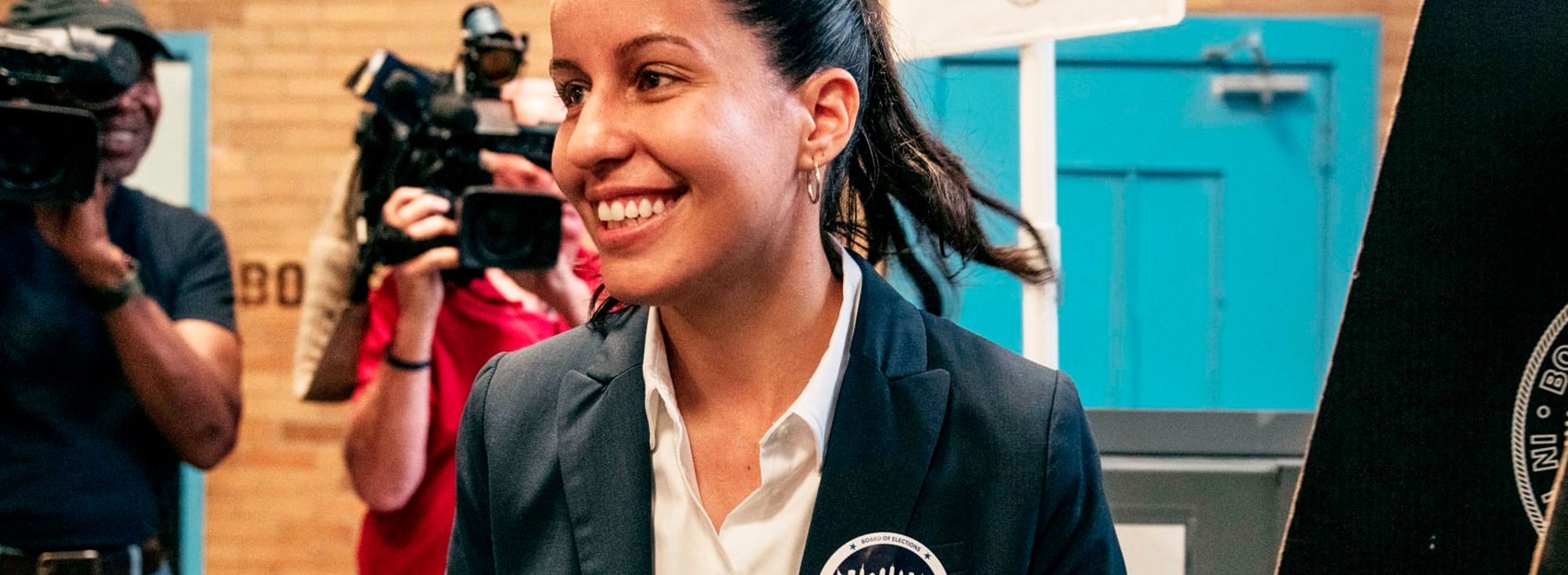This last year has been a sea change in sex workers' rights in the United States. The decades of building community, mutual aid, and developing our shared language and framework has foregrounded an unprecedented level of attention and discussion on the subject of sex workers' lives. Below are some of the incredible achievements in sex workers' rights policy that happened this year.
We got closer than ever to Decrim in the United States
This year was a landmark for the move towards removing the criminal laws and penalties for trading sex. In DC, the Sex Workers Action Committee (SWAC) had the first ever hearing on a full decriminalization bill before a legislative body. The hearing was over 14 hours and took testimony from activists, organizers and sex workers from the District on how decriminalization would change their lives.
In DC, the Sex Workers Action Coalition (SWAC) became the first group to have their bill for decriminalization of the sex trade come to a hearing before the subcommittee reviewing it. This comes after two years of campaigning for decriminalization which has spanned media, door-knocking and town halls. You can still watch all fourteen hours of the groundbreaking hearing here.
Y’all...today’s a historic day...we been organizing, hustling, and fighting for this for so long.
— DECRIMNOW DC (@DecrimNowDC) October 17, 2019
Today is the hearing for the bill to decriminalize sex work in DC. A chance to fight for safety and freedom, together.
Safety isn’t police...it’s community. pic.twitter.com/ly6igmhJkO
In New York, a full decriminalization bill was introduced this year by DecrimNY, making it the first state in history to make such an attempt. Making it even close to passage, a bill to remove criminal penalties for loitering for the purposes of prostitution almost made it through the state legislature, but would not move to the floor for a vote.
Progress for sex workers' health and safety has taken on multiple forms this year. California passed a law to both grant immunity from prostitution charges when reporting being victimized [California Globe], or witness to a crime, as well as banning the use of condoms as evidence of prostitution state-wide. Washington state also passed a similar immunity bill, hopefully being showing the pathway forward for more states in 2020. In Minnesota, dancers were able to advocate a bill expanding their rights as workers [Star Tribune].
Policy change takes more than one swing, and many steps forward were taken ven if they didn't pass, including a Task Force in LA [Los Angeles Blade] looking at sex workers' experiences of violence and exploitation, one study in Rhode Island [Providence Journal] and one on labor conditions in Nevada brothels, and international efforts such as decriminalization of the sex trade in the South Australia province [ABC News].
Multiple bills were also defeated or stalled this year, including new provisions which would restrict movement for those working in brothels [Las Vegas Sun], of ban them altogether; Florida's proposed public registry [Vice] of people convicted of solicitation, and it looks like the PROTECT Act [Reason] might be at least slowed down.
Sex Work Became a Federal Issue
Figuring out what to do on the Federal level regarding sex work has always been tricky – sex work criminalization is almost exclusively a state and local issue, and many of the policies which impact sex workers are filtered through other bills (like ones related to trafficking) and implemented through ambiguous administrative policies. In 2019, though, the issue of sex workers' rights became one that made federal representatives take notice, and led many to begin having conversations on how to improve the health and safety of sex workers.
Rep. Ayanna Pressley took a step in introducing a resolution for criminal legal reform which included, for the first time, a call to fully decriminalize sex work [Vice]. The plan includes many types of reform including bringing communities more into these conversations and ending the school-to-prison pipeline. You can read all of HR 702 here.
On December 17 of this year, some reps took another step towards understanding and addressing the impact that internet platforms have had on sex workers' health and safety by introducing the SAFE SEX Workers Study Act. The bill, sponsored in the House by Rep. Ro Khanna and Rep. Barbara Lee, would look at the impact of losing access to internet platforms - including both Backpage and those closed due to FOSTA/SESTA. According to Rep. Khanna, whose office was central in helping to draft and foster the bill,
“Sex workers have relied on such internet platforms to screen clients and negotiate boundaries for consensual, transactional sex services, including condom use and other harm reduction strategies. While SESTA/FOSTA was intended to curb online sex trafficking, by banning the “promotion of prostitution,” a host of internet platforms relied on by sex workers have shut down. My bill would mandate the first national study investigating how the shutdown of websites in connection with SESTA/FOSTA impact the health and safety of people who rely on consensual, transactional sex.
In the Senate, the bill is being sponsored by presidential candidate and data-loving Senator Elizabeth Warren and is backed by other front-runner for Presidential nominee Sen. Sanders, both on whom voted for FOTSTA, which passed 98-1 in the Senate. In a statement on the issue, Sen. Warren said, "As lawmakers, we are responsible for examining unintended consequences of all legislation, and that includes any impact SESTA-FOSTA may have had on the ability of sex workers to protect themselves from physical or financial abuse."
The bill represents what could be a turning point, not only because it is the first to specifically direct the government to consider the health and safety of sex workers, but also to consider the impact of anti-trafficking legislation on the community.
Presidential candidates also got in on the decrim conversation, with most of those still in the race having made some kind of comments at this point. Several, including both Sen. Sanders and Sen. Warren have expressed being open to decriminalization [Reason], while Mayor Pete says criminalization is a framework to revisit [Out]. The topic also popped up at some of the presidential debates, both formally, when Sen. Klobuchar (who has tried to make her name as a cop-forward human trafficking savior) received a question about legalization of sex work [CNS News], and informally when an activist shouted, "shouted "End FOSTA/SESTA! Protect trans sex workers!" [Them.us] during the live debate.

Prosecutors Getting in on the Change
This year we also saw decrim take on new meaning in the conversation about "progressive prosecutors." While there is ample debate on whether there is any such thing as a progressive prosecutor while the criminal legal system is so committed to the state violence of arrest and incarceration, and disproportionately enacts this violence on communities of color, it may be one form of incremental change that would impact the day to day lives of some. In San Francisco, Chesa Boudin has announced that he will not prosecute prostitution [SFist], among other quality-of-life crimes, showing there is more than one way to decriminalize in practice.
And though ultimately Tiffany Caban, who was vocal about her support for sex workers' rights, lost her run for the Queens DA [The Cut], her race showed just how much change is possible, and how we can't consider only one type of win. Caban has remained vocal on Twitter about her support for decriminalization of sex work, as well as other important forms of criminal legal reform, and we can't wait to support her in the next election [NY Times].

But these two aren't alone. Harris County (Houston), Texas candidate Audia Jones has also joined the new wave, also saying she would not prosecute prostitution [The Appeal] if elected DA.
Art Reflecting Life
2019 was a great year for sex worker media and representation. Based on the true story of two strippers who didn't let the downturn in the economy get the best of them, this year Hustlers killed at the box office [NY Times], and is even getting Oscar buzz for star Jennifer Lopez [Billboard]. This season of Pose, a show about New York City's ballroom culture in the late 80's and early 90's had us all wrapped around its finger, helped to further the destigmatization of sex work [the Independent], and then broke our hearts when it showed the murder of Candy while she engaged in sex work [Mother Jones].

Sex workers also got their first comic book super hero this year with SFSX, a comic book "queer leather sex worker rebel dystopian scifi action adventure," by writer, educator and advocate Tina Horn. (#4 just came out last week!) Also released this year was Hustling Verse, an anthology of poetry from sex workers and Camgirl gave us a new memoir on what it means to be a (surprise!) camgirl.
Sex workers were prominent in galleries across the country. New York's Leslie Lohman Gallery has been showing "On Our Backs: The Revolutionary Art of Queer Sex Workers" [Artforum] since September, featuring sex workers like Shine Louise Houston, Bruce LaBruce, and Annie Sprinkle.
Remembering Those We've Lost
It was also another year where we lost far too many to violence. In just the last two weeks, Angel Rose and Yahira Nesby [Pink News] lost their lives to violence, capping off a year where violence against the trans community was called an epidemic [NY Times]. Layleen Polanco also reminded the world that sex workers often lose their lives at the hands of the system and perpetrators of state violence. Polanco, who was a member of the House of Extravaganza, passed away fom medical complications when she was held in solitary confinement at Rikers Island. While the courts still say that arrested sex workers need forced services instead of jail time, Layleen was incarcerated when she failed to show up for one of the many court dates people are required to attend while going through the often excessive and therapy (not economic) focused sessions after being arrested.
Looking Ahead
So many things happened this year, and there is so much to watch for in the coming year. There are now two (TWO!) places with decriminalization bills to move, new conversations and coalitions forming in multiple states to get involved with, Federal policy to educate on and more than ever, to learn and read.
Things I'll be watching:
- Florida is gearing up for the 2020 Super Bowl with increased anti-sex work enforcement. And it's Florida. And the Super Bowl.
- Florida is also not letting their Kraft fuck up go [Vanity Fair], and is now threatening to combine his misdemeanors into a felony [The Hill] while those arrested as victims are still in deportation limbo.
- While the PROTECT Act might be stalling, it doesn't mean it's going anywhere any time soon, and the issue of substance use, trafficking and sex workers are just too much of a combination to be left to the experts.
- A bill which is pushing for international End Demand legislation was quietly introduced recently, by one of the primary sponsors of FOSTA, who has championed its deadly results as a "success." We'll see where it goes.
- Big tech isn't slowing down [CNBC] to make sure their interests are in line with those of their users. I'm expecting more crack downs, but hopefully also more space being demanded by sex workers to join in those conversations.
- Whether Nigeria is about the become the next country to decriminalize.
- And of course, the forming conversations on decrim that are sweeping across the states.
2020 will be the beginning of a whole new decade in sex workers' rights, building on a decades-in-the-making foundation of mutual support and community knowledge. The only guarantee is that, with so many things on the brink of change and fruition, it will be beyond our wildest dreams.
Cheers to the grind. 🥂

